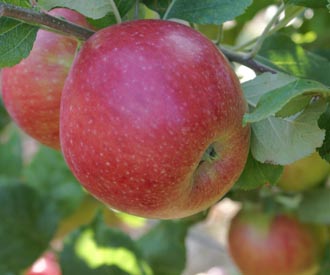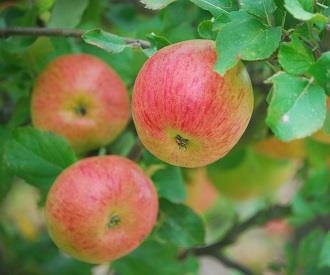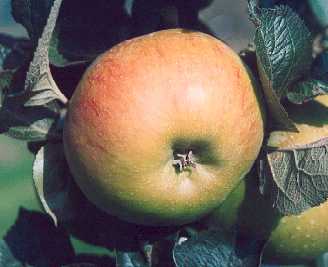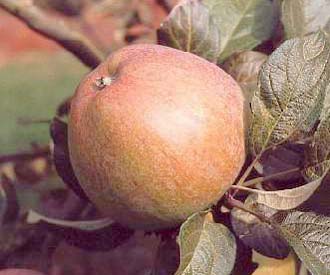Autumn 2025 / Winter 2026 seasonWe still have plenty of trees left for the winter planting season, but it is best to order ASAP.
Keepers NurseryThe UK's largest range of fruit trees
Tel. 01622 326465
Newton Wonder

An attractive and popular traditional English cooking apple.
Origin: Derrbyshire UK, 1870
Pollination: Newton Wonder is partially self-fertile and would produce some crop without a pollinator but would benefit considerably from a pollinator.Find pollination partners >
British-grown  All our bare-root trees are personally hand-grafted by our Nursery Manager and grown on at our nursery in Kent. We have Defra and Plant Healthy certification.
More ...
All our bare-root trees are personally hand-grafted by our Nursery Manager and grown on at our nursery in Kent. We have Defra and Plant Healthy certification.
More ...
Try these similar varieties
History and description of Newton Wonder
The original seedling is said to have been found growing in the thatch of the Hardinge Arm inn at King's Newton, Melbourne, Derbyshire, UK c 1870 by the innkeeper Mr Taylor. He planted it in his garden where it survived until the 1940's. Parentage is not known for certain but is believed to be a Dumelow's Seedling Blenheim Orange cross. The variety was introduced by Pearson & Co of Nottingham in 1887 and was awarded a First Class Certificate by the RHS in the same year. Has been grown commercially in the UK in the past and still is on a very small scale. A popular garden variety.Very large, flat-round fruit. Greenish yellow skin covered with orange red flush and red stripes. Firm, juicy, creamy yellow flesh. Good flavour but not as sharp as Bramley. Cooks to a cream coloured fluff. Good as a baking apple. Good keeping qualities. Can be used as a brisk eating or a salad apple in the winter.
Vigorous, spreading tree. Resistant to scab and canker but susceptible to mildew and bitter pit. Heavy cropper but with a biennial tendency. Suitable for growing in northern Britain.
Characteristics of Newton Wonder apple trees
| Use | Culinary |
| Colour | Flushed |
| Flavour | Subacid |
| Fruit size | Large |
| Picking time | Mid Oct |
| Season of use | Nov-Mar |
| Tree vigour | Vigorous |
| Tree habit | Spreading |
| Fruit-bearing | Spur-bearer |
| Cropping | Heavy |
| Disease resistance | Mildew - Susceptible Scab - Resistant Canker - Very resistant |
| Suitable for | Late Frost Northern Britain Wet Regions |
| Pollination date | 14 |
| Pollination group | D |
| Self-fertility | Partially self-fertile |
| Pollinators | Pollination partners |
| Parentage | Blenheim Orange Dumelow's Seedling |
| Progeny | Howgate Wonder |
| Sports | Crimson Newton Wonder |
Varieties you viewed


